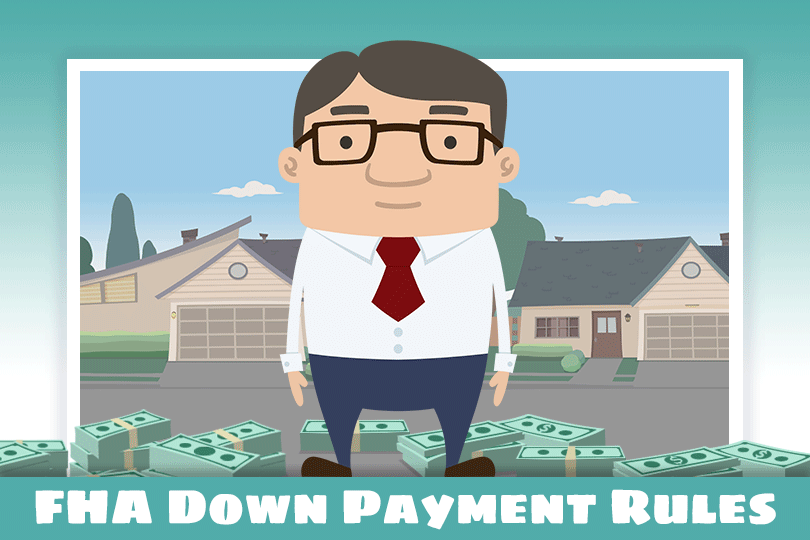Things to Know About Making an FHA Loan Down Payment
August 9, 2021
Lenders Need to Mitigate Risk
Making a sizeable down payment gives lenders peace of mind, knowing that a borrower would not part with a large amount of money if they did not intend to come through on the entire loan. Depending on the type of mortgage you apply for, the down payment requirement may vary. For most conventional loans, borrowers are generally required to pay 20% of the purchase price, whereas FHA loans have a low requirement of 3.5%. FHA-approved lenders feel more comfortable accepting this smaller amount since the loans are insured by the FHA, and the lenders are protected in the case of borrowers defaulting.
Private Mortgage Insurance
Even though most conventional loans come with the 20% minimum down payment criteria, there are borrowers who cannot meet that requirement. This does not always exclude them from being approved. In the same way the FHA charges a Mortgage Insurance Premium with their loans, conventional mortgage lenders require that any borrowers paying less than 20% toward the down payment must purchase Private Mortgage Insurance (PMI).
If you are considering a conventional mortgage, it is important that you understand how Private Mortgage Insurance works. While it helps you qualify for a loan that you could not otherwise afford, it does increase the cost of the loan itself. You can make a lower payment upfront, but the monthly PMI premium will be added into your monthly mortgage payments. Additionally, PMI does not protect you, it protects the lender from losses if you are unable to pay back the loan. In most cases, you will not have to make PMI payments for the life of the loan. Pertaining to the conventional loan, once you have built up more than 20% equity in your home, you can put in a request to have the monthly PMI charge dropped. Talk to your loan officer to make sure this is an option before you sign!
Down Payments and Interest Rates
While the amount of money you put down on a home may not affect the interest rate you receive from the lender, it does impact the amount of interest you pay over the life of the loan. Making a larger down payment means paying less in interest, since you are borrowing less money. Imagine that you are buying a $200,000-home with a down payment of $20,000. You would be paying interest on a $180,000 loan. (200,000 – 20,000). Whereas if you paid only $10,000 upfront, you’d be paying interest on a $190,000-loan instead.
Down payments are one of the most daunting factors of homebuying for many first-time buyers. Saving up such a huge chunk of funds is not always an affordable option for most people, and so they get stuck in a “renter’s trap.” While it can be a little overwhelming, it’s important for prospective homebuyers to do their research and learn about their options, including Down Payment Assistance Programs. Head to www.fha.com to for a comprehensive list of programs for each state.
------------------------------
RELATED VIDEOS:
Consider the Benefits and Risks of a Joint Loan
Borrowers Should Know About the Origination Fee
Everyone Needs to Pay Their Property Tax

FHA Loan Articles
April 30, 2025 In a previous post, we discussed why FHA borrowers should carefully consider whether paying for discount points truly serves their best interests, focusing on factors like short-term homeownership, opportunity cost, FHA mortgage insurance, and the prevailing interest rate environment. Discount points are an option for borrowers willing to pay a fee to lower the interest rate by a set amount. This is not right for all borrowers, and you don't want to pay for points you won't benefit from during the loan term.
April 29, 2025Are you considering buying a home with an FHA loan? You'll likely talk to your participating lender about FHA loan "discount points" – fees you pay upfront for a lower interest rate on your mortgage. The idea behind discount points is a straightforward exchange: you spend money today to reduce your interest rate. Typically, one point equals one percent of your total FHA loan. In return, your interest rate might decrease by an amount you and the lender agree upon.
April 28, 2025Home loans have various expenses that aren't apparent to a new borrower until much later in the process. What do you need to consider when making your home loan budget? It might not be complete without addressing some of the issues we cover here.
April 23, 2025 While the prospect of lower interest rates or more favorable loan terms can be enticing, there are situations where waiting is the better option. Refinancing without carefully considering your current financial circumstances is never a good idea, but careful planning in the current financial environment is even more important.
April 22, 2025First-time home buyers worry about loan approval, but there are important steps to take to increase the likelihood that the lender will approve their application for the loan or pre-approval. What do you need to know before you choose a lender?







